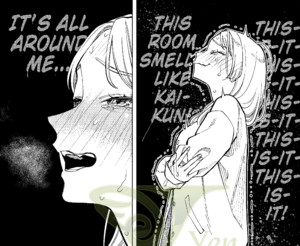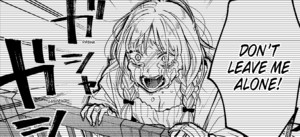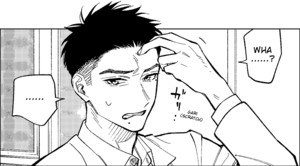The Fall 2025 Manga Guide
What Do You Call This Trash?
What's It About?

Akira is the girl of Yuuto's dreams―so maybe he's got a shot, now that his big brother dumped her… But big bro ended the relationship for a reason. Akira is an obsessive, clingy stalker, a total trash fire of a girl who would happily manipulate Yuuto's feelings for a chance to get near the man she loves again. Of course, Yuu knows that, but he still can't resist!
What Do You Call This Trash? has art and story by Tetsukazu. English translation is done by Amber Tamosaitis and lettering by Rachel J. Pierce. Published by Yen Press (September 23, 2025). Rated OT.
Is It Worth Reading?
Lauren Orsini
Rating:

Forget “manic pixie dream girl.” This dumpster fire romance stars a girl who is just manic. Yandere fans will instantly fall for Akira, a girl who makes ahegao faces not because of sex, but in the process of committing her many stalking-related crimes. Fans of Scum's Wish will adore this romance about imperfect, misguided people looking for love in all the wrong places. This single 350-page volume contains a full story—complete with a time-skip epilogue—and deeply satisfying backstories that detail why each twisted character is the way they are. If you're ready to go dumpster diving for the ultimate in Garbage x Garbage love stories, look no further.
The premise is a soap opera mess from page one. Yuu is in love with Akira, who is still in love with Yuuto's big brother Kai even after Kai dumped her. And Kai was right to do so: Akira is a needy, messy girl who was contacting Kai and his family at all hours of the day and night. Now, Yuuto and Akira have come to an amicable arrangement: he aids and abets her stalking his brother (only just short of criminal activity) and she “pays” upfront with favors like letting Yuu touch her cheek or hold her hand. If you guessed that all of these people have some serious trauma dating back to childhood, you're right on the money. It's the peak of “everyone here should be in therapy” content, which is why it makes for such good entertainment. I was satisfied by Akira's faces alone—her heart eyes, drooling mouth, and shivery contentment whenever she so much as hears or smells Kai are the height of unhinged characterization.
The love triangle gets even more complex over time. Both Kai and Yuuto have love interests beyond Akira, making it a messy love quintangle—and that's not even getting into the fraught love-hate relationship between the two brothers. The real magic comes from the cause and effect of their trauma over time: first, they're hurt in a specific way, then they lick their wounds with one another in poor coping mechanisms that also make complete logical sense. There was also a satisfying ending that explained what happened to each of the characters years after the events of the story, and I especially appreciated that it didn't try to tie up this trashy mess with a neat, unbelievable bow. But from beginning to end, the best part was Akira and her off-the-rails personality. Even as other characters struggled with the morality of their actions toward other people, Akira was unburdened by such troublesome thoughts. And I think that's beautiful. Read What Do You Call This Trash? to show everyone that you support women's wrongs.
Jean-Karlo Lemus
Rating:

“Holy crap, these kids are nuts!” ...he says as he grabs the popcorn bucket.
Tetsukazu's entire What Do You Call This Trash? has been compiled into an omnibus, and the series is all the better for it; it's far too uncomfortable to read piecemeal, but far too compelling to avoid entirely. What we have here is a very twisted teen romance between a lot of kids with way too many skeletons in their closet: Yuuto is helping Akira stalk his big brother—and Akira's ex—Kai. In exchange, Akira gives Yuuto small acts of physical intimacy (hand-holding or headpats). It's a completely toxic set-up that only gets worse once Kai starts dating someone else in earnest—and actually learns what a healthy relationship is like, for once.
What makes What Do You Call This Trash? work so well is how deep its roots are laid. We see the tragic reason as to why Akira is so gung-ho about Kai's affection, specifically, as well as the sadder reason why Kai himself is so particular about his younger brother. Yuuto, bless his heart, is desperate to be “true to his name” (“Yuuto” is written with the characters for “kind” and “person”, as the translation notes point out), but can't even begin to imagine how far the wounds his brother and his ex both carry go. The tragic part is that we never even see a resolution on those ends of the story; Akira's relationship with her mother is left hanging, and Kai and Yuuto's relationship with their parents isn't discussed either. This isn't “tragic” because it's left hanging—it's tragic because that lack of closure cuts so close to real life.
What Do You Call This Trash? hits hard, not just because of its misguided teens doing stupid, stupid things, but also because of how deep it digs into the causes behind their actions. No doubt, there will be many moments where someone might find themselves in the same shoes as Yuuto, Kai, or Akira. I can only hope that many people similarly find themselves in Kai's position, where he meets his girlfriend's family and marvels at what true warmth is like. Strongly recommended—with a content warning for child abuse.
Kevin Cormack
Rating:

If I were to describe my experience reading this manga, I'd call it a 350-page sustained anxiety attack with a constant undercurrent of stomach-churning dread. Doesn't sound like a good time, does it? But stay with me here, this is a fantastic story. Just maybe one I don't ever want to read again.
I don't believe author Tetsukazu has ever been published in English before, but they're clearly a creator to keep an eye on, considering the strength of this double-volume-length complete story. Yes, this isn't a series; it's a complete narrative with a very satisfying denouement that's worth experiencing. Once.
Main characters Akira and Yuuto are self-described as “trash”. They've got problems, as have basically all of the characters in this gritty, stressful contemporary drama. Akira's the kind of unhinged female character you could reductively describe as “yandere”, but there's much more to her. She's absolutely a girl that good parents should warn their sons about, but she's not an inhuman monster, despite her terrifying obsession over Yuuto's elder brother Kai, and the way she effortlessly manipulates Yuuto and others to fulfill her goals. She's a planner and a user. She's also absolutely pitiful, almost certainly because of a shitty upbringing.
Akira is the swirling, churning, selfish ball of concentrated gravity that everyone else orbits around, no matter how badly they want to escape. Soft-hearted Yuuto is like a deer in the headlights, transfixed by her beauty and vulnerability. He knows she's broken, that she's bad for him, but he can't keep away. The fantastic ending hinges on his eventual choice to perceive her as an actual human being with unmet emotional needs, outside of his personal feelings for her.
Big brother Kai is a fascinating character whose motivations have multiple layers that slowly unpeel throughout the plot. While Yuuto and his spiraling into the abyss form the focus for the story's first half, we see things from Kai's perspective in the second, and it's revelatory. It's such a skilfully constructed story, tense, tightly wound, with some deeply unsettling emotional abuse at its core. With reading that kind of dark, powerful material comes a great deal of discomfort, much like with a Shūzō Oshimi manga, though less lurid. It's well worth persevering through the escalating narrative car crash to reach the cathartic resolution. I felt it was worthwhile, if exhausting.
Disclosure: Kadokawa World Entertainment (KWE), a wholly owned subsidiary of Kadokawa Corporation, is the majority owner of Anime News Network, LLC. Yen Press, BookWalker Global, and J-Novel Club are subsidiaries of KWE.
discuss this in the forum (2 posts) |
back to The Fall 2025 Manga Guide
Seasonal homepage / archives